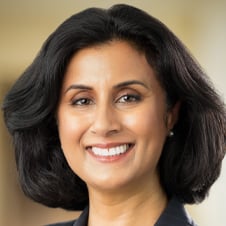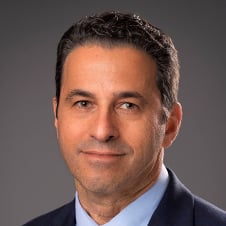As a response to the COVID-19 pandemic, Atlantic Health System established a committee that was largely focused on physician well-being. It was very effective for the need at that moment and for the time it was in place. But with the health system’s goal to be the best place for physicians to practice in New Jersey, they recognized that the work is broader than what could have been done through just that committee structure. Atlantic Health System needed new well-being leadership. Enter Shai Gavi, DO.
While Dr. Gavi has been with Atlantic Health System for some time, he stepped into a new role of chief medical officer to enhance the physician experience and reexamine the well-being work being done. But he isn’t doing it alone—he has a strong team to help that still works within the committee structure. This team includes associate chief medical officers, Judy Washington, MD, and Jeanine Bulan, MD.
Atlantic Health System is a member of the AMA Health System Program, which provides enterprise solutions to equip leadership, physicians and care teams with resources to help drive the future of medicine.
“Our data—depending on whom you compare us with—could be at the average or even at little bit better than most health systems. However, when we step back and reflect on those numbers, it’s unacceptable to us and it should be unacceptable to everyone that there are so many people who are feeling burnout at all,” said Suja Mathew, MD, an internal medicine physician and executive vice president and chief clinical officer for Atlantic Health System.
At Atlantic Health System, 38% of physicians reported having experienced or currently experiencing some symptoms of burnout in the past year. Meanwhile, others expressed difficulty disconnecting and freeing their mind from work.
“Even if we are doing better than most health systems, when we consider that our physician staff have trained for as long as they have to enter this profession with the intention and mission that they come into the profession with, that is not the group that they should be suffering,” Dr. Mathew added. “Even if it was only 10%, that would still be unacceptable. It should be unacceptable to all of us at Atlantic, but also across the industry.”
While “about 25% to 30% of physicians are unfavorable around decompression and disconnecting from work, the data from 2023 indicated that, overall, there is very high satisfaction working for Atlantic Health System,” said Dr. Gavi, who practices hospital medicine there. In addition, “there’s a very high culture of safety and a lot of pride working at Atlantic Health System—but there are opportunities.”
Here is how Atlantic Health System integrated a systemwide well-being strategy after a change in leadership.
Use data to track the progress
Atlantic Health System has used other measurement tools for some time to measure all team members—including physicians—and for patient experience, said Dr. Mathew. These tools “allow us to track our progress.”
But Atlantic Health System will also weave in a new survey to add more depth to the data they can use to guide well-being efforts: the AMA’s Organizational Biopsy®.
“We are moving forward and we’re working with the AMA on questions to do the Organizational Biopsy, and that may be in the spring, so we don’t overlap with the Press Ganey survey. But we’re excited to look at those questions,” said Dr. Gavi. “We went through a series of questions and picked out what questions seemed really pertinent for us.”
“We value data. We do recognize the limitations of quantitative data, but that’s one of the reasons we’re committed to doing the Organizational Biopsy with the AMA: so we can get the relevant data,” said Dr. Mathew. “It’s also why we’re going to continue to do the Press Ganey survey because it allows us to track our improvement over the years.”
“But still, there are always opportunities. Even when we’re doing well, there are areas where we can improve,” Dr. Mathew said. “So, we do lean very strongly into any data that we’re able to acquire not just once, but also track longitudinally.”
As the leader in physician well-being, the AMA is reducing physician burnout by removing administrative burdens and providing real-world solutions to help doctors rediscover the Joy in Medicine™.
Listen to physicians to guide change
Dr. Gavi routinely performs listening tours with Drs. Washington and Bulan to hear what physicians and other health professionals are looking for. This is also performed by regional medical directors at Atlantic Health System.
“Within about a month or two of starting this role, we’ve had seven virtual town halls,” he said. “In the fall of 2023, we had over 200 clinicians attend where I was able to share results from our clinician survey and at the same time get a lot of feedback and thoughts from others.”
In the spring of 2024, “we did another series of town halls and, again, more than 200 clinicians attended, and I had an opportunity to share what we’re doing as a medical group,” Dr. Gavi said. “But, more importantly, the opportunity to hear from our clinicians what is happening, what is working.”
Additionally, “we have multiple committees and work groups where we provide opportunities for dialogue,” he said. “The important thing for us in this shift is actively listening to our clinicians as to what’s important and what we need to do and working in partnership with them.”
Embrace physician work groups
“What we’ve learned is that clinicians want to have input into what’s happening around them, around their practice. They want to be a partner and have some autonomy,” Dr. Gavi said. “We have about 20 committees and work groups for clinicians to be involved with.”
“For example, we’ve created a surgical work group where surgeons from multiple specialties meet monthly to discuss relevant practice matters that matter to a surgeon,” he said. “We have a women in medicine work group … to discuss what’s working, what’s not, and share best practices.”
“Another one that we’re really excited about is called the ‘Next Generation Work Group.’ This is a physician work group that is for those who are three years into completing residency,” Dr. Gavi said. “It’s a really exciting work group where they’re meeting together about what it means to go from residency to now being a full physician—that transition to practice.”
Additionally, “we have a physician-led board that helps provide direction and recommendations and input towards vision strategies and others,” he said.
Don’t go at it alone
“I’ve had a long relationship with the AMA for several years, including around the well-being work, and I had the privilege of working with the practice-transformation team when we were envisioning Joy in Medicine years ago,” Dr. Mathew said. “I have such a strong appreciation for this mission work that the AMA does.”
She also noted that working with the practice transformation team has been “a continuous resource for this work” and that working with the AMA Health System Program team has also been impactful because they “help create those connections with others in the AMA that can help meet our needs as a health system.”
Working with the AMA has “been fantastic. Most of it is mission work and I appreciate it deeply. It’s helped me from one organization to the next to bring those resources and to level the playing field across different organizations and resource levels,” Dr. Mathew said.
“Coming into this role as a new chief medical officer, the AMA was really a tremendous partner to give me the tools and resources to help lead this work,” Dr. Gavi said, emphasizing that the AMA “really has been a tremendous guide in how to move forward with this important work, opportunities to speak to people who have done it, other sites to listen to and learn from webinars as well as the AMA STEPS Forward® resources—we’re able to share them with our clinicians.”
Additionally, “we gave AMA membership for all our physicians, so they have access to all these tools, which is really important too,” he said. “Secondarily, obviously the Joy in Medicine program and for us to apply, whether it’s the bronze, silver or gold, is a way to really validate the work.”
Then there is “the Organizational Biopsy. To have a tool that really assesses resilience, well-being and others and to be able to do that with the AMA has been tremendous,” Dr. Gavi said. “On so many levels, it’s a great partnership and opportunity for us. We’re very excited.”
Seek recognition to validate efforts
Receiving recognition from the AMA Joy in Medicine Health System Recognition Program “is fantastic. We are on a journey to be the very best place for physicians to practice and this is validation that we are on the right track,” Dr. Mathew said. “We’re delighted to receive the bronze level. We have every expectation for ourselves to move along that journey and reach higher levels over time. But it’s really a validation that we are on the right path.”
“It’s an honor and a validation and I’m hoping our clinicians feel supported by the fact that we recognize that there is tremendous work to help support them and it’s validated through the AMA,” Dr. Gavi echoed. “And we absolutely will continue this work towards gold, obviously.”
“I recommend that everyone go through the Joy in Medicine process because it’s very much more than just a recognition. It is, in fact, a road map,” Dr. Mathew said. “Whether you achieve a leveled award or not, it gets you on that journey and that’s how we use it. We use it as a guidebook, a road map for what are the best practices in the industry that if we implement it here at Atlantic, we really should see the fruit of that.”
“Just jump in. Regardless of where you might score the first year, it’s all about your journey,” she said. “Leaders within an organization should be courageous enough to speak to this as a priority and be very explicit about it.”
“We want to be the very best place for physicians to practice here in our region. Speaking to it publicly makes it clear what our goal is, but it also holds us and the organization accountable for that so we're not mincing words,” Dr. Mathew reiterated. “That has been an important move for us to make to elevate this work appropriately.”






